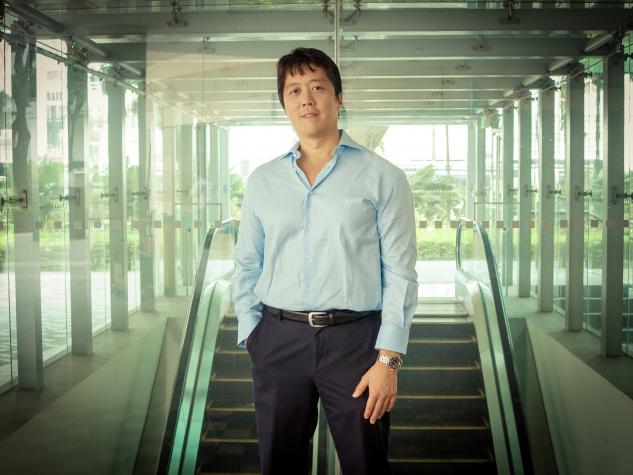
Associate Professor Norman Li, an evolutionary social psychologist from the SMU School of Social Sciences, is studying how the ancient ‘software’ in our brains deals with the constant stimuli assailing us in the modern world.

Photo Credit: Darren Yau
By Dora Yip
SMU Office of Research (26 January 2014) – From an evolutionary standpoint, the human brain pre-dates the birth of agriculture and the rise of cities and technology. The way we think, feel and process information is adapted to the ancestral environment we have lived in for the past million years. Which begs the question: what are the new stimuli that are associated with modern life doing to our brains and importantly, our mental health and wellbeing?
Associate Professor Norman Li, an evolutionary psychologist from the Singapore Management University (SMU) School of Social Sciences, seeks to answer this question through his research on the mismatch between modern environments and the mind’s adaptive mechanisms. “I’m interested in how the old software (in our brains) operates in the new environment, and what kind of information it is actually processing now,” he says.
Citing the universal example of food preference, Professor Li explains that the reason most people like sugar, salt, and fat-rich foods boils down to how little our brains have changed since humans were hunter-gatherers. “We evolved tastes for sweet, fatty and salty things to lead us to eat the most nutritious foods in the natural environment, including ripe fruit and nuts, and also meat, which was scarce and we had to hunt for ourselves. In the modern day, these evolved preferences lead to problems because food is now available in mass quantities and manufactured with unnaturally high levels of sugar, fat, and salt. This leads to wider health problems like diabetes and heart disease. In more natural environments where humans still live, these aren’t real problems,” he says.
From high finance to evolutionary psychology
Professor Li’s transition into academia reflected his pursuit of a more fulfilling career. Bored with his job in the “endless hedonic treadmill” of the Chicago financial world, he took various evening classes at Northwestern University and found that evolutionary psychology resonated with him. “It provided satisfying answers for why we do certain things,” he says.
Over the years, Professor Li noticed extremely high amounts of antidepressant use around him. “People these days seem to be overly stressed. We never feel satisfied with ourselves. We’re too fat, too unattractive, or too unsuccessful. The list never ends,” he says.
The allure of a simpler life became more obvious when Professor Li visited his own ancestral village in China. “When I first visited when I was 17, I was too young and modernised to appreciate (my relatives’) lives and only noticed that they were terribly poor. Now when I see them, I think they are in many ways better off than me, with their warm and genuine smiles. Their lives are natural in that they are surrounded by kin and familiar faces all their lives. They have difficulties, yes, but they don’t have to deal with modern day stresses like crazy deadlines, flooded inboxes and multi-tasking overloads. They live the kind of life our minds are equipped to deal with. The stimuli have increased a hundred-fold in the modern world, and our brains are not built to handle this,” he said.
Technology: boon or bane?
Technology, media and competing priorities are changing our lives and, according to Professor Li, manifesting in serious problems like the prevalence of shooting incidents in his home country of America, to the global surge of eating disorders, and even to decreasing fertility rates in Singapore and beyond.
Much of the problem lies in the way our brains process images, explains Professor Li. For example, a man looking at a picture of a naked female may get an erection, even though there is no real mating opportunity since there is no real person there. Yet it still happens because our minds cannot truly distinguish fake from real. In the same way, a woman looking at a beauty magazine cannot help but compare herself unfavourably to the attractive models in the advertisements.
Against the backdrop of a digital age, Professor Li is conducting research on what can potentially be done to help us counter the effects of processing information from the modern world. While the majority of the modern world’s population lives in cities, our minds still perceive natural environments as safe and comforting, he says. Hence, being in and even looking at pictures of natural environments can have significant mood benefits, he adds.
Citing Singapore as an example, as life in kampongs (villages) becomes a distant memory, Professor Li predicts higher rates of depression, anxiety and work stress. “People feel like they cannot do it all anymore. They don’t feel relaxed and they feel like they don’t have enough money. The trend will continue for people to delay marriage and not have children.”
As part of his research on the link between marriage and materialism, Professor Li said that in big Asian cities like Singapore, part of economic success goes hand in hand with having consumerist values. His research has shown a negative correlation between materialism and getting married and having children. “Materialism didn’t quite exist the same way in our ancestral environment as it does now. In the past, all we had were a few tools and trinkets to show for. Now, we have an endless amount of products we feel we have to buy to make ourselves feel better.”
According to Professor Li, the upshot is that it will be tough for governments to promote both economic success and maintain fertility rates. “Economic success in the global economy is related to hyper-competition and a culture of materialism, which competes with people’s interest in family. So even if people can afford a child, it gets in the way of their lifestyle. And when lifestyle competes with having family, in the modern world, we know we can circumvent the (procreation) process.”
For all its promises, Professor Li believes that modern technology is ultimately behind many of the sociological problems plaguing the modern world. Even as technology increases efficiency and reduces human error, it dehumanises jobs and removes the ability for people to make decisions in their daily lives, he says. “We’ve all become computer operators. From an employer’s perspective, I think companies will be interested in what we can do to make employees work harder without becoming anxiety-ridden or wanting to quit their jobs. From a public policy perspective, it’s about what can we do to improve fertility rates and the stability of the family,” he says.
A mid-1990s convert himself, Professor Li is now a proponent for the study of evolutionary psychology and says it will continue to be used in a wide range of research. “Just like many other scientific breakthroughs, there was a lot of resistance to it when it came on the scene in the 1980s and 90s. But now many more people in different fields are understanding the concepts and using it in their research. This framework will be most useful for mental health and wellbeing, as well as for business. People are catching on to it, and are starting to wonder how it will improve our lives,” he says.
See More News
Want to see more of SMU Research?
Sign up for Research@SMU e-newslettter to know more about our research and research-related events!
If you would like to remove yourself from all our mailing list, please visit https://eservices.smu.edu.sg/internet/DNC/Default.aspx

